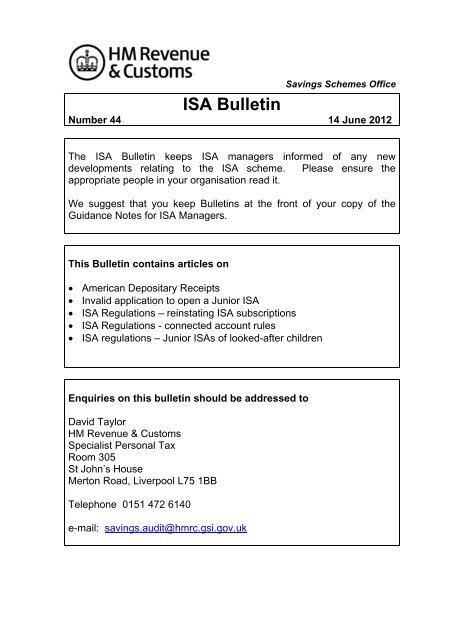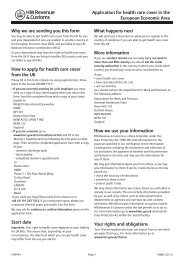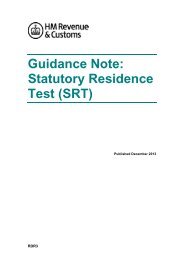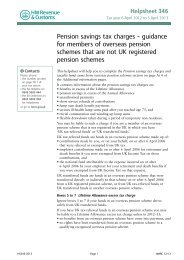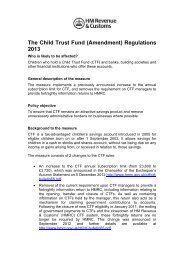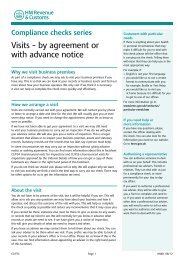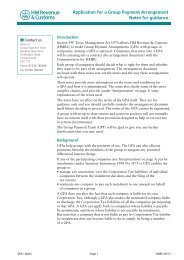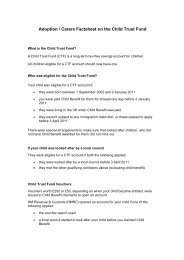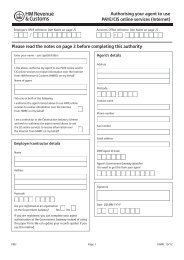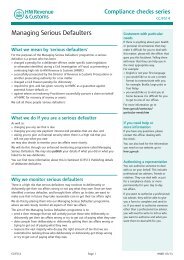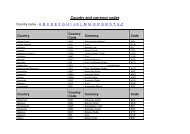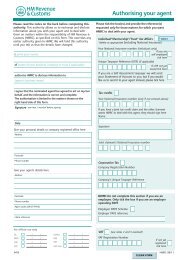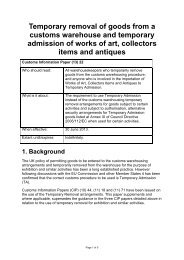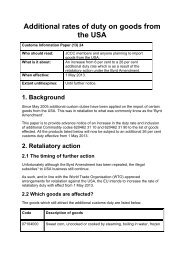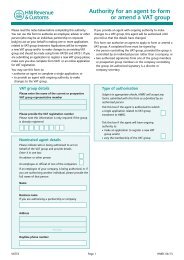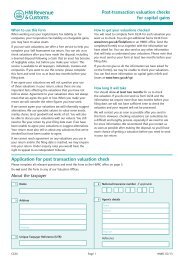ISA Bulletin 44 (PDF 93K) - HM Revenue & Customs
ISA Bulletin 44 (PDF 93K) - HM Revenue & Customs
ISA Bulletin 44 (PDF 93K) - HM Revenue & Customs
Create successful ePaper yourself
Turn your PDF publications into a flip-book with our unique Google optimized e-Paper software.
Savings Schemes Office<br />
<strong>ISA</strong> <strong>Bulletin</strong><br />
Number <strong>44</strong> 14 June 2012<br />
The <strong>ISA</strong> <strong>Bulletin</strong> keeps <strong>ISA</strong> managers informed of any new<br />
developments relating to the <strong>ISA</strong> scheme. Please ensure the<br />
appropriate people in your organisation read it.<br />
We suggest that you keep <strong>Bulletin</strong>s at the front of your copy of the<br />
Guidance Notes for <strong>ISA</strong> Managers.<br />
This <strong>Bulletin</strong> contains articles on<br />
� American Depositary Receipts<br />
� Invalid application to open a Junior <strong>ISA</strong><br />
� <strong>ISA</strong> Regulations – reinstating <strong>ISA</strong> subscriptions<br />
� <strong>ISA</strong> Regulations - connected account rules<br />
� <strong>ISA</strong> regulations – Junior <strong>ISA</strong>s of looked-after children<br />
Enquiries on this bulletin should be addressed to<br />
David Taylor<br />
<strong>HM</strong> <strong>Revenue</strong> & <strong>Customs</strong><br />
Specialist Personal Tax<br />
Room 305<br />
St John’s House<br />
Merton Road, Liverpool L75 1BB<br />
Telephone 0151 472 6140<br />
e-mail: savings.audit@hmrc.gsi.gov.uk
American Depositary Receipts<br />
A depositary interest (including a depositary receipt ‘DR’) can be a qualifying<br />
investment for a stocks and shares <strong>ISA</strong> (regulation 7(2)(ha)) but regulation 4(6)(a)(i)<br />
requires the <strong>ISA</strong> account investor to have beneficial ownership of the investment.<br />
The commonest type we see are American Depositary Receipts (ADRs).<br />
The recent decision of the First Tier Tribunal in the Stamp Duty Reserve Tax case of<br />
HSBC Holdings and Bank of New York Mellon v Commissioners for <strong>HM</strong>RC, UKFTT<br />
163 (TC) has shown that in some cases beneficial ownership may not rest with the<br />
underlying investor.<br />
Where a DR is issued in the UK the <strong>HM</strong>RC view is that the holder of a DR is the<br />
beneficial owner of the underlying shares so the DR can be a qualifying investment.<br />
Where a DR is issued outside the UK the question of whether the holder of the DR is<br />
the beneficial owner of the underlying shares will be determined by reference to the<br />
law of the territory in which the DR is issued. Information on beneficial ownership<br />
may be provided to investors by the depository. Where the relevant law means that<br />
the holder of a DR is not the beneficial owner of the underlying shares, the DR<br />
cannot be a qualifying investment that can be held in a stocks and shares <strong>ISA</strong>.<br />
Where beneficial ownership of the underlying shares cannot conclusively be<br />
determined by reference to the law governing the arrangements relating to the issue<br />
of the DRs, for tax purposes <strong>HM</strong>RC will continue to determine beneficial ownership<br />
according to its understanding of the principles of UK law. This means that <strong>HM</strong>RC<br />
will continue to apply its longstanding practice of regarding the holder of a DR as<br />
holding the beneficial interest in the underlying shares.<br />
Invalid application to open a J<strong>ISA</strong><br />
We have been asked for further clarification about what providers should do when a<br />
J<strong>ISA</strong> registered contact tells them the child has a CTF or another J<strong>ISA</strong>. We've been<br />
asked about 3 specific scenarios.<br />
1) A J<strong>ISA</strong> is opened by a parent. The parent later informs the manager that<br />
the child is eligible for a CTF.<br />
This could mean that the child already has a CTF or has become entitled to one -<br />
for example, where a Child Benefit appeal for a period before 4 January 2011 is<br />
settled.<br />
The manager needs to have this confirmed in writing for their records. They can<br />
then remove the J<strong>ISA</strong> wrapper from the account. If the parent does not provide<br />
confirmation in writing the manager must flag the account so that no further<br />
subscriptions are accepted and no new management instructs can be accepted.<br />
2) A J<strong>ISA</strong> is opened by a parent who later informs the manager that they or the<br />
other parent have opened a J<strong>ISA</strong> elsewhere.<br />
If the other J<strong>ISA</strong> that has been opened is of the other type, then no further action<br />
needed. If the other J<strong>ISA</strong> is of the same type, then one of them must cease to be
treated as a J<strong>ISA</strong>. The first account opened is the valid J<strong>ISA</strong> so the second must<br />
be closed. The manager should obtain confirmation in writing that either:<br />
(i) the J<strong>ISA</strong> with them is the later account in which case the J<strong>ISA</strong> wrapper can<br />
be removed from the account<br />
or<br />
(ii) the J<strong>ISA</strong> with them is the valid account and that the wrapper has been<br />
removed from invalid account, or it has been closed. The manager can then<br />
continue to accept subscriptions.<br />
If neither confirmation is received the manager must flag the account so that no<br />
further subscriptions can be accepted and no new instructions can be accepted.<br />
3) A J<strong>ISA</strong> is opened and the manager is later informed that the registered<br />
contact does not have parental responsibility for the child.<br />
In the first instance, the manager should seek confirmation from the existing<br />
registered contact that the account opening declaration was invalid.<br />
If confirmation is received, or the existing registered contact fails to respond, the<br />
account can continue if someone with parental responsibility steps forward and<br />
completes an application to be registered contact. The manager does not need<br />
the agreement of the existing registered contact and the application should be<br />
treated as if the existing registered contact cannot be contacted (see paragraph<br />
21.6.2 of the <strong>ISA</strong> Guidance Notes).<br />
If confirmation that the declaration is invalid is received, but no one with parental<br />
responsibility steps forward, the J<strong>ISA</strong> wrapper should be removed from the<br />
account.<br />
If the existing registered contact fails to respond, but no one with parental<br />
responsibility steps forward, the account must be flagged so that no further<br />
subscriptions or management instructions can be accepted.<br />
<strong>ISA</strong> regulations<br />
Attached to the bulletin are 3 working drafts of <strong>ISA</strong> amendment regulations (along<br />
with one draft of CTF amendment regulations) that we hope to lay before Summer<br />
recess. They are still undergoing final checks.<br />
We would be very grateful for any comments on these drafts by close 27 June and<br />
we apologise for this very tight timetable.<br />
The drafts cover<br />
� <strong>ISA</strong> reinstatement<br />
� Amending the connected account rules (for both <strong>ISA</strong> and CTF)<br />
� Allowing The Share Foundation to open and take on the registered contact role<br />
for Junior <strong>ISA</strong>s of looked-after children.<br />
REINSTATING <strong>ISA</strong> SUBSCRIPTIONS
As announced in <strong>ISA</strong> <strong>Bulletin</strong> 28, the <strong>ISA</strong> regulations are being amended to allow for<br />
the reinstatement of <strong>ISA</strong>s where either a cash manager is declared in default, or<br />
where compensation is received in respect of a stocks and shares <strong>ISA</strong> qualifying<br />
investment.<br />
The regulation provides different rules for:<br />
� cash manager failures – a single subscription of up to the balance held in the<br />
failed <strong>ISA</strong> at the time of default will be allowed into either a cash <strong>ISA</strong> or a stocks<br />
and shares <strong>ISA</strong><br />
� compensation received in respect of stocks and shares qualifying investments – a<br />
single subscription of up to the amount of compensation received can be<br />
made to a stocks and shares <strong>ISA</strong><br />
� failures linked to the collapse of Lehman Brothers – a single subscription of up to<br />
the value of the failed investment at the time of the Lehmans collapse can be<br />
made to a stocks and shares <strong>ISA</strong>, and<br />
� Keydata Investment Services – a single subscription can be made into a stocks<br />
and shares <strong>ISA</strong> of up to the amount originally subscribed for the failed Keydata<br />
investment<br />
A draft regulation is attached to the bulletin and we would welcome any comments<br />
by 27 June which will allow us to lay the regulation before Parliament rises for the<br />
Summer recess.<br />
Commentary<br />
New reg 5D Subscriptions made in accordance with this regulation will not count<br />
towards the annual subscription limits.<br />
New reg 5DA ‘Defaulted cash account subscription’. Where a cash <strong>ISA</strong> manager is<br />
declared in default, the investor can make a subscription up to the<br />
balance held in the cash <strong>ISA</strong> at the time of the default into either a<br />
cash <strong>ISA</strong> or stocks and shares <strong>ISA</strong>, without it counting towards the<br />
annual subscription limits. The subscription must be made within 180<br />
days of the default.<br />
New reg 5DB ‘Defaulted investment subscription’. This allows a ‘defaulted<br />
investment payment’ to be subscribed to a stocks and shares account<br />
within 180 days of the investor receiving the payment. The maximum<br />
amount of the payment is<br />
� For Lehman accounts – see new reg 5DL<br />
� For Keydata accounts – see new reg 5DM<br />
� For other stocks and shares failures – the amount of the<br />
compensation received.<br />
New reg 5DC The rules for a cash <strong>ISA</strong> reinvestment are triggered when the FSA or<br />
FSCS determine that there has been a default.<br />
New reg 5DD This describes the type of payments that a stocks and shares <strong>ISA</strong><br />
investor could receive which can be reinvested into a S&S <strong>ISA</strong> without<br />
counting as a fresh <strong>ISA</strong> subscription. Broadly, these are<br />
compensation payments that would be subject to CGT if they were<br />
paid in respect of an investment that was not held in an <strong>ISA</strong>.
New reg 5DE As investments held in a Junior <strong>ISA</strong> can be freely transferred between<br />
cash and stocks and shares (and vice versa) this reg allows a<br />
compensation payment made in respect of a S&S Junior <strong>ISA</strong> to be<br />
paid into a cash Junior <strong>ISA</strong>.<br />
New reg 5DF The draft regulations do not require the investor to be given a<br />
‘reinvestment certificate’ (as has been the been the case for Northern<br />
Rock, Keydata etc). Instead, the investor wishing to make the<br />
reinvestment will have to provide information to the <strong>ISA</strong> manager.<br />
� For reinvestment following a cash manager default, the information<br />
must show the amount held in the account at the time of default<br />
and also details of any current year subscriptions made in the year<br />
of default.<br />
� For stocks and shares investment failures<br />
� Evidence of the amount of the compensation payment and the<br />
date it was paid<br />
� Details of the failed investment in respect of which the payment<br />
was made<br />
� Details of the <strong>ISA</strong> manager who held the investment when it<br />
failed, and<br />
� Details of the person making the compensation payment<br />
New reg 5DG This allows the investor to make only a single reinvestment (unless a<br />
later payment of compensation is received).<br />
New reg 5DH / DI<br />
Payments received before the regulations come into force will be<br />
treated as having been received on the date the regs take effect. This<br />
will allow reinvestment within 180 days of this date.<br />
For cash manager failures and for compensation received in respect<br />
of stocks and shares investments, any payments received after 6 April<br />
2011 can be reinvested.<br />
The special rules for Lehman cases apply to any payments made after<br />
the collapse in 2008 and for Keydata to any payments made after the<br />
administration in 2009.<br />
The relevant definitions cover:<br />
� Keydata investments, whether held by Keydata as <strong>ISA</strong> manager or<br />
by any other manager<br />
� Lehman Brothers Investments, which were investments for which<br />
Lehman Brothers acted as the sole counterparty<br />
New reg 5DJ For Lehman cases, the information required is as in reg 5DF above,<br />
and in addition<br />
� The value of the investment on the date Leman Bros collapsed<br />
� Details of any subscriptions already made in respect of this<br />
particular investment, along with details of the <strong>ISA</strong> managers to<br />
whom the subscriptions were made.
New reg 5DL Lehman cases. Investors can reinvest the greater of the value of the<br />
investment when Lehman Bros collapsed, or the total of the<br />
compensation payments received. If a payments are received after<br />
the regulations come into force these will each have their own 180 day<br />
reinvestment period and any amounts already reinvested must be<br />
taken into account when determining how much of the latest payment<br />
can be reinvested.<br />
New reg 5DM Keydata cases - this mirrors the approach in reg 5DL above.<br />
The information required by reg 5DJ must include details of the<br />
amount of the subscription used to acquire the Keydata investment.<br />
New reg 6 This amends existing reg 31 which covers amounts that must be<br />
included on the annual return. Where there is a cash manager default<br />
and current year subscriptions were made to the failed manager,<br />
these subscriptions must be included in the return made by the<br />
manager accepting the reinvestment subscription.<br />
CONNECTED ACCOUNT REGULATIONS<br />
As announced in <strong>ISA</strong> <strong>Bulletin</strong> 42, the draft regulations attached qualify the connected<br />
accounts rule so that from 1 November 2011, the date that the Junior <strong>ISA</strong> was<br />
launched, an <strong>ISA</strong> or Junior <strong>ISA</strong> that is connected to another tax exempt account will<br />
not breach the rule. For the purpose of the regulations, a tax exempt account is an<br />
<strong>ISA</strong>, Junior <strong>ISA</strong> or CTF account.<br />
A similar amendment will be made to the CTF connected accounts rule. For CTF<br />
purposes, a deposit account or share account must not be connected to any other<br />
investment (as opposed to the <strong>ISA</strong> rule which is limited to the account being<br />
connected to another deposit or share account). So this amendment will allow a CTF<br />
to be connected to a tax exempt investment which means an investment held in an<br />
<strong>ISA</strong>, Junior <strong>ISA</strong> or CTF account.<br />
JUNIOR <strong>ISA</strong>S FOR LOOKED AFTER CHILDREN<br />
As announced in a Dept. for Education Press Notice of 1 November 2011, the Junior<br />
<strong>ISA</strong> scheme is to be extended to allow accounts to be opened for children who have<br />
been in care for a continuous period of at least 12 months starting after 2 January<br />
2011 (the final date for CTF eligibility).<br />
The attached draft regulation will amend the <strong>ISA</strong> regulations to allow the Share<br />
Foundation to open a Junior <strong>ISA</strong> for looked after children and/or to take on the<br />
Registered Contact role. The version attached is ‘work in progress’ and needs to be<br />
updated to include the statutory cross references defining the appropriate looked<br />
after children in Scotland.
STATUTORY INSTRUMENTS<br />
2012 No. XXXX<br />
INCOME TAX<br />
CAPITAL GAINS TAX<br />
The Individual Savings Account (Amendment No XX)<br />
Regulations 2012<br />
Made - - - - ***<br />
Laid before the House of Commons ***<br />
Coming into force - - ***<br />
The Treasury make the following Regulations in exercise of the powers conferred by section 694<br />
to 696, 699 and 701 of the Income Tax (Trading and Other Income) Act 2005(a) and section 151<br />
of the Taxation of Chargeable Gains Act 1992(b).<br />
Citation and commencement<br />
1. These Regulations may be cited as the Individual Savings Account (Amendment No. XX)<br />
Regulations 2012 and come into force on *** 2012.<br />
Amendment to the Individual Savings Account Regulations 1998<br />
2. The Individual Savings Account Regulations 1998(c) are amended as follows.<br />
3. In regulation 2A(4) (meaning of account investor), after “regulations 5C,” insert “5D to 5DD,<br />
5DF,”.<br />
4. After regulation 5C (treatment of certain sums held in dormant accounts) insert—<br />
“Subscriptions disregarded for the purposes of the subscription limits in regulations<br />
4ZA and 4ZB<br />
5D.—(1) A subscription to an account made in accordance with this regulation shall be<br />
disregarded for the purposes of the subscription limits in regulations 4ZA and 4ZB.<br />
(2) A subscription to an account held by an account investor is made in accordance with<br />
this regulation if—<br />
(a) 2005 c. 5; sections 694(1A), 695A, 699(9) and 701(6) were inserted by section 40 of the Finance Act 2011 (c. 11); section<br />
701(4) and (5) were inserted by section 40 of the Finance Act 2008 (c. 9) and sections 695(3) and (4), 696(3) and 699(1)<br />
and (2) were amended by paragraphs 131 and 132 of Schedule 4 to the Commissioners for <strong>Revenue</strong> and <strong>Customs</strong> Act 2005<br />
(c. 11).<br />
(b) 1992 c. 12; section 151(2) was substituted by section 64(2) of the Finance Act 1995 (c. 4), paragraph 436 of Schedule 1 to<br />
the Income Tax (Trading and Other Income) Act 2005 (c. 5) and amended by section 40 of the Finance Act 2011 (c. 11);<br />
section 151(4) was inserted by section 85 of the Finance Act 1993 (c. 34).<br />
(c) S.I. 1998/1870; relevantly amended by […] and S.I. 2011/1780.
(a) the subscription is—<br />
(i) a defaulted cash account subscription;<br />
(ii) a defaulted investment subscription; or<br />
(iii) permitted in accordance with regulation 5DE; and<br />
(b) the account manager of the account to which the subscription is made is provided<br />
with the information specified in regulation 5DF as relevant to the subscription.<br />
Defaulted cash account subscription<br />
5DA. A subscription is a defaulted cash account subscription if—<br />
(a) it is made to an account (which may be a stocks and shares account or a cash<br />
account) held by an account investor who held a cash account (“defaulted cash<br />
account”) in respect of which a default event occurred no more than 180 days<br />
before the subscription is made; and<br />
(b) it does not exceed the amount held in the defaulted cash account immediately<br />
before the default event occurred (including interest accrued but not paid at that<br />
time).<br />
Defaulted investment subscription<br />
5DB. A subscription is a defaulted investment subscription if—<br />
(a) it is made to a stocks and shares account held by an account investor to whom a<br />
defaulted investment payment has been made no more than 180 days before the<br />
subscription is made; and<br />
(b) it does not exceed the amount of the defaulted investment payment.<br />
Default event in respect of cash account<br />
5DC. A default event in respect of a cash account held by an account investor occurs<br />
where, on or after [date when regulations come into force], the account manager of that<br />
account is determined to be in default under rule COMP 6.3.2R of the Financial Services<br />
Authority Handbook by the Financial Services Authority or the Financial Services<br />
Compensation Scheme.<br />
Defaulted investment payment<br />
5DD. A defaulted investment payment occurs where a payment is made on or after [date<br />
when regulations come into force] to an account investor (otherwise than by accretion to a<br />
stocks and shares account) by way of compensation in respect of the poor performance,<br />
loss, depreciation or risk of depreciation of an investment described in regulation 7<br />
(”defaulted investment”) held by the account investor in a stocks and shares account<br />
(whether or not the defaulted investment continues to be held in the account at the time of<br />
the payment).<br />
Additional permitted subscription to a junior <strong>ISA</strong> account<br />
5DE. A subscription is permitted by this regulation if it is made to a junior <strong>ISA</strong> account<br />
that is a cash account but would have been a defaulted investment subscription if it had<br />
been made to a stocks and shares account.<br />
Information required by regulation 5D<br />
5DF.—(1) The information specified by this regulation is—<br />
(a) in relation to a defaulted cash account subscription—
(i) the amount held in that account immediately before the default event occurred<br />
(including interest accrued but not paid at that time); and<br />
(ii) the current year’s subscription made to the defaulted cash account;<br />
(b) in relation to a defaulted investment subscription or a subscription permitted by<br />
regulation 5DE—<br />
(i) evidence of the amount of the defaulted investment payment and the date it<br />
was paid;<br />
(ii) details of the defaulted investment in respect of which the defaulted<br />
investment payment was made;<br />
(iii) the full name and address (including postcode) of the account manager of the<br />
stocks and shares account in which the defaulted investment was held;<br />
(iv) the full name and address (including postcode) of the maker of the defaulted<br />
investment payment.<br />
(2) In this regulation—<br />
“current year’s subscription” in relation to a defaulted cash account means—<br />
(a) subscriptions made to the account in the year in which the permitted cash account<br />
subscription is made, but before the default event; and<br />
(b) subscriptions made to any other account held by the account investor in the year in<br />
which the permitted cash account subscription is made and transferred to the<br />
account before the subscription is made.<br />
Single regulation 5D subscription<br />
5DG. Only one defaulted cash account subscription, defaulted investment subscription or<br />
subscription permitted by regulation 5DE may be made in respect of a defaulted cash<br />
account or a defaulted investment payment as the case may be notwithstanding that the<br />
subscription made is an amount less than that which could have been made by way of such<br />
subscription in accordance with regulation 5D.<br />
Default event or default investment payment occurring in the period beginning on 6th<br />
April 2011 and ending before [date when the regulations come into force]<br />
5DH. Anything occurring in the period commencing on 6th April 2011 and ending before<br />
[date when regulations come into force] that, if it had occurred after that period, would<br />
have been—<br />
(i) a default event in respect of a cash account within regulation 5DC, or<br />
(ii) a defaulted investment payment within regulation 5DD,<br />
shall be treated as occurring on [date when regulations come into force] for the purposes of<br />
regulations 5D to 5DG.<br />
Special provision in respect of Lehman Brothers investments and Keydata<br />
investments<br />
5DI.—(1) Regulations 5DJ to 5DM make special provision in respect of an investment<br />
that is a Lehman Brothers investment or a Keydata investment.<br />
(2) An investment is a Lehman Brothers investment if—<br />
(a) the investment was a qualifying investment held by an account investor in a stocks<br />
and shares account on 15th September 2008;<br />
(b) Lehman Brothers Holdings Inc. acted as the sole counterparty underwriting the<br />
investment on that day; and<br />
(c) the investment was not sold or otherwise disposed of on that day so as to cause it<br />
to cease to be a qualifying investment of the account on that day or any other day.
(3) An investment is a Keydata investment if—<br />
(a) the investment was a qualifying investment held by an account investor in a stocks<br />
and shares account on 8th June 2009;<br />
(b) Keydata Investment Services Limited (Keydata) on that day—<br />
(i) was the account manager of the account, or<br />
(ii) administered the account for another account manager; and<br />
(c) the investment was not sold or otherwise disposed of on that day so as to cause it<br />
to cease to be a qualifying investment of the account on that day or any other day.<br />
Special application of regulations 5DB, 5DD, 5DF and 5DH in respect of a Lehman<br />
Brothers investment<br />
5DJ. In respect of a Lehman Brothers investment—<br />
(a) regulation 5DB shall apply as if—<br />
(i) sub-paragraph (b) provided that a defaulted investment subscription must not<br />
exceed the amount of the defaulted investment payment determined in<br />
accordance with regulation 5DL;<br />
(ii) after sub-paragraph (b) there is inserted—<br />
“(c) no defaulted investment subscription may be made in respect of a defaulted<br />
investment payment made or treated as made on [date when regulations<br />
come into force] other than a single defaulted investment payment treated as<br />
made by virtue of regulation 5DL(2).”;<br />
(b) regulation 5DD is subject to regulation 5DL(2);<br />
(c) regulation 5DF(1)(b) shall apply as if the information specified by it is—<br />
(i) the information specified in paragraphs (i)-(iv) of that regulation;<br />
(ii) the value of the defaulted investment at the opening of trading on the London<br />
Stock Exchange on 15th September 2008;<br />
(iii) the date and amount of any earlier defaulted investment subscriptions in<br />
respect of the Lehman Brothers investment in question made before the<br />
making of the defaulted investment subscription;<br />
(iv) the name and address (including postcode) of the account manager to whom<br />
any subscription referred to in paragraph (iii) was made;<br />
(d) regulation 5DH—<br />
(i) shall apply as if the period mentioned in that regulation were the period<br />
commencing on 16th September 2008 and ending on [date when regulations<br />
come into force];<br />
(ii) is subject to regulation 5DL(2).<br />
Deemed defaulted investment payment in respect of a Lehman Brothers investment<br />
5DK. A defaulted investment payment shall be treated as made on [date when regulations<br />
come into force] in respect of a Lehman Brothers investment to the account investor who<br />
held it.<br />
Specified amount for the purposes of a defaulted investment subscription in respect of<br />
a Lehman Brothers investment<br />
5DL.—(1) This regulation determines the amount which a defaulted investment<br />
subscription must not exceed for the purposes of regulation 5DB(b) in relation to a<br />
defaulted investment payment made or treated as made in respect of a Lehman Brothers<br />
investment.
(2) Where one or more defaulted investment payments in respect of a Lehman Brothers<br />
investment are made on [the date the regulations come into force] or are treated as made on<br />
that day by virtue of regulations 5DH or 5DK , they shall be treated as if they comprised a<br />
single defaulted investment payment made on that day of an amount which is the greater<br />
of—<br />
(a) the value of the investment at the opening of trading on the London Stock<br />
Exchange on 15th September 2008; or<br />
(b) the total of the payments made or treated as made by virtue of regulation 5DH on<br />
[date when the regulations come into force].<br />
(3) Where a defaulted investment payment in respect of a Lehman Brothers investment is<br />
made after [the date when the regulations come into force], its amount for the purposes of<br />
regulation 5DB(b) is the greater of—<br />
(a) the amount determined by the formula A � B where—<br />
(i) “A” is the total of the single defaulted investment payment treated as made on<br />
[the date when the regulations come into force] in respect of the investment<br />
by virtue of paragraph (2) and all defaulted investment payments made in<br />
respect of it in the period commencing after that day and ending immediately<br />
after the defaulted investment payment in question;<br />
(ii) “B” is the total of all defaulted investment subscriptions made in respect of<br />
the Lehman Brothers investment before the subscription in question; or<br />
(b) the amount determined by the formula C � D where—<br />
(i) “C” is the value of the investment at the opening of trading on the London<br />
Stock Exchange on 15th September 2008;<br />
(ii) “D” is the total of all defaulted investment subscriptions made in respect of<br />
the Lehman Brothers investment before the subscription in question.<br />
Special application of regulations 5DJ to 5DL in respect of a Keydata investment<br />
5DM. In respect of a Keydata investment—<br />
(a) regulations 5DJ to 5DL shall apply as if-<br />
(i) a reference to a Lehman Brothers investment were a reference to a Keydata<br />
investment;<br />
(ii) a reference to 16th September 2008 were a reference to 8th June 2009;<br />
(b) (i) the information described in regulation 5DJ(c)(ii) is not required to be<br />
provided to the account manager of the account to which the subscription in<br />
question is made;<br />
(ii) details of the amount of the subscriptions used to acquire the Keydata<br />
investment in question are required to be so provided;<br />
(c) regulation 5DL(2)(a) shall apply as if it referred to the amount of subscriptions<br />
made to the account (or any other account or personal equity plan) and other<br />
proceeds (including income) representing those subscriptions used to purchase the<br />
investment;<br />
(d) regulation 5DL(3)(a)(i) shall apply as if element “A” is the amount described in<br />
regulation5DL(2)(a) as construed in accordance with sub-paragraph (c) of this<br />
regulation;<br />
(e) regulation 5DL(3)(b)(i) shall apply as if element “C” is the total of the single<br />
defaulted investment payment treated as made on [the date when the regulations<br />
come into force] in respect of the investment by virtue of regulation 5DL(2) and all<br />
defaulted investment payments made in respect of it in the period commencing<br />
after that day and ending immediately after the defaulted investment payment in<br />
question.
5. In regulation 31 (returns of information by account manager)—<br />
(a) in paragraph (3)(c)(ii), after “paragraph (3A)” insert “and (3AB)”; and<br />
(b) after paragraph (3A) insert—<br />
“(3AB) Where a defaulted cash account subscription in accordance with regulation 5D<br />
(subscriptions disregarded for the purposes of the subscription limits in regulations 4ZA<br />
and 4ZB) is made to an account in the year or part of the year for which a return required by<br />
this regulation is made, the amount of subscriptions reported to an account manager in<br />
accordance with regulation 5DF(1)(a)(ii) (current year’s subscriptions made to the defaulted<br />
cash account) must be included as part of the total amount of cash subscribed to the account<br />
required by paragraph (3)(c)(ii).”.<br />
Name<br />
Name<br />
Date Two of the Lords Commissioners of Her Majesty’s Treasury
EXPLANATORY NOTE<br />
(This note is not part of the Order)<br />
These Regulations, which come into force on *** 2012, amend the Individual Savings Account<br />
Regulations 1998 (S.I. 1998/1870) (“the <strong>ISA</strong> Regulations”) to allow certain subscriptions to<br />
accounts to be disregarded for the purposes of the subscription limits, in cases where there has<br />
been a default by the cash account manager or where a compensation payment has been made to<br />
the investor in relation to the failure of a stocks and shares account.<br />
Regulation 1 and 2 provide for the citation and commencement of these Regulations and generally<br />
for the amendment of the <strong>ISA</strong> Regulations.<br />
Regulation 3 amends the definition in regulation 2A(4) of the <strong>ISA</strong> Regulations, clarifying the term<br />
“account investor” for the purposes of new regulations 5D to 5DD and 5DF in relation to junior<br />
<strong>ISA</strong>s.<br />
Regulation 4 inserts the new regulations 5D to 5DM into the <strong>ISA</strong> Regulations. Regulation 5D<br />
provides for the general rule that defaulted cash account subscriptions, defaulted investment<br />
subscriptions and subscriptions permitted by regulation 5DE are to be disregarded for the purposes<br />
of the <strong>ISA</strong> subscription limits, so long as the information specified in inserted regulation 5DF is<br />
provided to the account manager. The new regulations 5D to 5DM provide as follows.<br />
Regulation 5DA provides that a defaulted cash account subscription is one made (to a cash or<br />
stocks and shares account) within 180 days of a default event, not exceeding the amount invested<br />
in the defaulted account immediately before the default event occurred. Regulation 5DB provides<br />
that a defaulted investment subscription is one made to a stocks and shares account within 180<br />
days of a defaulted investment payment being made to an account investor, not exceeding the<br />
amount of the defaulted investment payment. Where a subscription is made to a cash junior <strong>ISA</strong><br />
account, but would have been a defaulted investment subscription if made to a stocks and shares<br />
account, it is permitted by regulation 5DE.<br />
Regulations 5DC and 5DD describe what is meant by a default event and defaulted investment<br />
payment. A default event occurs when the cash account manager is determined to be in default in<br />
accordance with rules contained in the Financial Services Handbook (made by the Financial<br />
Services Authority under the powers in the Financial Services and Markets Act 2000 (c. XX)). A<br />
defaulted investment payment is made where the account investor receives compensation for poor<br />
performance, loss or depreciation of an investment in a stocks and shares account.<br />
Regulation 5DF describes the information which must be provided to the account manager when a<br />
subscription under regulation 5D is made. Regulation 5DG provides for the general rule that only<br />
one subscription under regulation 5D or 5DE may be made notwithstanding that the amount<br />
subscribed is less than the maximum that could have been subscribed under that regulation.<br />
Where an event occurs after 6th April 2011 and before *** 2012 that would have been a default<br />
event for a cash account or a defaulted investment payment within regulations 5DC and 5DD if it<br />
had occurred after *** 2012, regulation 5DH provides that it shall be treated as occurring on ***<br />
2012 for the purposes of regulations 5D to 5DG.<br />
Regulation 5DI defines Lehman Brothers investment and Keydata investment, for the purposes of<br />
the special application to those investments of the general rules in regulations 5DB, 5DD, 5DF and<br />
5DH. In relation to a Lehman Brothers investment, regulation 5DJ applies regulation 5DB subject<br />
to the maximum amount of the single defaulted investment payment provided under regulation<br />
5DL(2). Broadly, in respect of defaulted investment payments made or treated (under regulation<br />
5DH) as made on *** 2012, the maximum amount is the greater of the value of the investment on<br />
15th September 2008 and the total payments made (or treated as made under regulation 5DH). In<br />
respect of subsequent subscriptions, regulation 5DL(3) provides the maximum amount is the<br />
greater of ……..
Regulation 5 of these Regulations makes consequential amendments to the requirements for<br />
returns to account managers in regulation 31 in relation to defaulted cash account subscriptions.<br />
A Tax Information and Impact Note covering this instrument [has been published on the <strong>HM</strong>RC<br />
website at …].
STATUTORY INSTRUMENTS<br />
2012 No. XXXX<br />
INCOME TAX<br />
CAPITAL GAINS TAX<br />
The Individual Savings Account (Amendment No. [ ])<br />
Regulations 2012<br />
Made - - - - ***<br />
Laid before the House of Commons ***<br />
Coming into force - - ***<br />
The Treasury make these Regulations in exercise of the powers conferred by sections 694 to 699<br />
and 701 of the Income Tax (Trading and Other Income) Act 2005(a) and section 151 of the<br />
Taxation of Chargeable Gains Act 1992(b):<br />
Citation, commencement and effect<br />
1.—(1) These Regulations may be cited as the Individual Savings Account (Amendment No. 3)<br />
Regulations 2012 and comes into force on [ ] 2012.<br />
(2) The amendments made by regulation 2 have effect from 1st November 2011.<br />
Amendments to the Individual Savings Account Regulations 1998<br />
2. The Individual Savings Account Regulations 1998(c) are amended as follows—<br />
(a) in regulation 2(1)(a) (interpretation), after the definition of “child” insert—<br />
““child trust fund” has the meaning given in section 1 of the Child Trust Funds Act<br />
2004(d)”;<br />
(b) in regulation 8 (qualifying investments for a cash component) for paragraph (3) insert—<br />
“(3) A deposit account or share account which is a qualifying investment for a cash<br />
component falling within paragraph (2)(a) or (b) respectively must not be connected with<br />
any other account falling within the descriptions in those sub-paragraphs, held by the<br />
account investor or any other person.<br />
(4) For the purposes of paragraph (3), an account is connected with another if—<br />
(a) 2005 c.5; sections 694(1A), 695A, 699(9) and 701(6) were inserted by section 40 of the Finance Act 2011 (c. 11), and<br />
section 701(4) and (5) was inserted by section 40 of the Finance Act 2008 (c. 9); sections 695(3) and (4), 696(3), 698(2), (3)<br />
and (4) and 699(1) and (2) were amended by paragraphs 131 and 132 of Schedule 4 to the Commissioners for <strong>Revenue</strong> and<br />
<strong>Customs</strong> Act 2005 (c. 11).<br />
(b) 1992 c. 12; section 151 was amended by section 40 of the Finance Act 2011 (c. 11).<br />
(c) S.I. 1998/1870; relevant amending instruments are S.I. 1998/3174, S.I 2003/2747, S.I. 2005/2561, S.I. 2005/3350, S.I.<br />
2008/704, S.I. 2008/1934, and S.I. 2011/1780.<br />
(d) 2004 c. 6.
(a) either of the accounts was opened with reference to the other, or with a view to<br />
enabling the other to be opened on particular terms, or with a view to facilitating<br />
the opening of the other on particular terms,<br />
(b) the terms on which the first mentioned account in this paragraph was opened<br />
would have been significantly less favourable to the holder if the other had not<br />
been opened, and<br />
(c) either of the accounts is not a tax exempt account.<br />
(5) The following are tax exempt accounts for the purposes of paragraph (4)—<br />
(a) an account opened (or treated as opened) in accordance with regulation 12 or 12A;<br />
(b) a child trust fund.”.<br />
Name<br />
Name<br />
Date Two of the Lords Commissioners of Her Majesty’s Treasury<br />
EXPLANATORY NOTE<br />
(This note is not part of the Regulations)<br />
These Regulations, which come in to force on [ ] 2012, amend the Individual Savings<br />
Account Regulations 1998 (S.I. 1998/1870) (“the <strong>ISA</strong> Regulations”). In exercise of the power<br />
in section 701(4) of the Income Tax (Trading and Other Income) Act 2005 (c. 5) to make<br />
regulations having effect in relation to times before they are made, regulation 2 has effect<br />
from 1 November 2011.<br />
Regulation 2 of these regulations amends regulation 8 of the <strong>ISA</strong> Regulations (qualifying<br />
investments for a cash component), so that an account will not be connected with another account<br />
for the purposes of regulation 8(3) of the <strong>ISA</strong> Regulations where both are tax exempt accounts. A<br />
tax exempt account is an <strong>ISA</strong>, a junior <strong>ISA</strong> or a child trust fund.<br />
A Tax Information and Impact Note covering this instrument will be published on the <strong>HM</strong>RC<br />
website at http://www.hmrc.gov.uk/thelibrary/tiins.htm.
STATUTORY INSTRUMENTS<br />
2012 No. XXXX<br />
CHILD TRUST FUNDS<br />
The Child Trust Funds (Amendment) Regulations 2012<br />
Made - - - - ***<br />
Laid before Parliament ***<br />
Coming into force - - ***<br />
The Treasury make the following Regulations in exercise of the powers conferred by sections 3(2)<br />
and 28(1) to (4) of the Child Trust Funds Act 2004(a):<br />
Citation and commencement<br />
1. These Regulations may be cited as the Child Trust Funds (Amendment) Regulations 2012 and<br />
come into force on [ ] 2012.<br />
Amendment of the Child Trust Funds Regulations 2004<br />
2. For paragraph (8) of regulation 12 of the Child Trust Funds Regulations 2004(b), substitute—<br />
“(8) A deposit account or share account which is a qualifying investment for an account<br />
falling within paragraph (2)(k) or (l) must not be connected with any other investment, held<br />
by the named child or any other person.<br />
(8A) For the purposes of paragraph (8), a deposit account or share account described in<br />
that paragraph, is connected with another investment if—<br />
(a) either was opened or acquired with reference to the other, or with a view to<br />
enabling the other to be opened or acquired on particular terms, or with a view to<br />
facilitating the opening or acquisition of the other on particular terms,<br />
(b) the terms on which the deposit account or share account was opened would have<br />
been significantly less favourable to the holder if the other investment had not been<br />
held, and<br />
(c) the other investment is not a tax exempt investment.<br />
(8B) The following are tax exempt investments for the purposes of paragraph (8A)—<br />
(a) an account investment held under a child trust fund;<br />
(b) an account investment within the meaning given in the Individual Savings Account<br />
Regulations 1998(c) held under an account opened (or treated as opened) in<br />
accordance with regulation 12 or 12A of those regulations.”.<br />
(a) 2004 c. 6.<br />
(b) S.I. 2004/1450; relevant amending instruments are S.I. 2005/909 and S.I. 2010/582.<br />
(c) S.I. 1998/1870; amended by S.I. 2001/908, S.I. 2002/1974, S.I. 2002/3158, S.I. 2003/2155, S.I. 2005/3230, S.I. 2005/2078,<br />
S.I. 2007/2119, S.I. 2008/704, S.I. 2009/1994 and S.I. 2011/1780.
Name<br />
Name<br />
Date Two of the Lords Commissioners of Her Majesty’s Treasury<br />
EXPLANATORY NOTE<br />
(This note is not part of the Regulations)<br />
These Regulations amend regulation 12 of the Child Trust Funds Regulations (S.I.<br />
2004/1450) (“the CTF Regulations”). They come into force on [ ] 2012.<br />
Regulation 2 of these regulations amends regulation 12 of the CTF Regulations (qualifying<br />
investments for an account), so that a deposit account or share account which is a qualifying<br />
investment will not be connected with another investment for the purposes of regulation 12(8) of<br />
the CTF Regulations where both are held in an <strong>ISA</strong> account, junior <strong>ISA</strong> account or a child trust<br />
fund.<br />
A Tax Information and Impact Note covering this instrument will be published on the <strong>HM</strong>RC<br />
website at http://www.hmrc.gov.uk/thelibrary/tiins.htm.
STATUTORY INSTRUMENTS<br />
2012 No. x<br />
INCOME TAX<br />
CAPITAL GAINS TAX<br />
The Individual Savings Account (Amendment No. X)<br />
Regulations 2012<br />
Made - - - - ***<br />
Laid before the House of Commons ***<br />
Coming into force - - ***<br />
The Treasury, in exercise of the powers conferred by sections 694, 695A and 701 of the Income<br />
Tax (Trading and Other Income) Act 2005(a) and section 151 of the Taxation of Chargeable<br />
Gains Act 1992(b) make the following Regulations:<br />
Citation and commencement<br />
1.These Regulations may be cited as the Individual Savings Account (Amendment No. X)<br />
Regulations 2012 and shall come into force on x.<br />
Amendments to the Individual Savings Account Regulations 1998<br />
2. The Individual Savings Account Regulations 1998(c) are amended as follows.<br />
3. In regulation 2(1)(a) (interpretation), after the definition of “xxx” insert—<br />
“ “Looked After Child” has the meaning given in regulation 2F (special provision in<br />
respect of Looked After Children)”.<br />
4. After regulation 2E, insert—<br />
(a) x<br />
(b) x<br />
(c) x<br />
(d) x<br />
“Special provision in respect of Looked After Children”<br />
(2F) A child is a Looked After Child where he or she, for a continuous period of at least<br />
12 months occurring after 2 January 2011—<br />
(a) is looked after by a local authority for the purposes of section 22(1) of the Children<br />
Act 1989 (general duty of local authority in relation to children looked after by<br />
them)(d); or<br />
(b) is in the care of the local authority by virtue of an order made under section<br />
31(1)(a) of the Children Act 1989 (care and supervision orders)(a); or
(c) is provided with accommodation by an authority by virtue of article 21 of the<br />
Children (Northern Ireland) Order 1995 (provision of accommodation for children:<br />
general)(b); or<br />
(d) is in the care of an authority or authorised person by virtue of an order made under<br />
article 50(1)(a) of the Children (Northern Ireland) Order 1995 (care orders and<br />
supervision orders)(c); or<br />
(e) is [x]; or<br />
(f) is [x](d); or<br />
(g) is [x] (e); or<br />
(h) is [x](f).<br />
(4) In relation to a Looked After Child, regulations 2C(4)(b) and 12A(4)(b)(i) may apply<br />
as if the Share Foundation has parental responsibility in respect of that child.<br />
(5) In relation to an application to assume responsibility for the management of a junior<br />
<strong>ISA</strong> account by the Share Foundation, regulation 2C(7)(c) must be construed as requiring a<br />
declaration that—<br />
(i) the applicant is the Share Foundation;<br />
(ii) the application is in relation to a Looked After Child; and<br />
(iii) the Share Foundation is to be the registered contact for the account.<br />
(6) Where an application to assume responsibility for the management of a junior <strong>ISA</strong><br />
account is made in relation to which the registered contact is the Share Foundation,<br />
regulation 2C(9)(a) must be construed as referring only to sub-paragraphs (e) and (g) of<br />
paragraph (10).<br />
(7) Where the registered contact in relation to a junior <strong>ISA</strong> account is the Share<br />
Foundation, any reference in these Regulations to the residence of the registered contact<br />
must be construed as meaning a reference to the registered offices of the Share Foundation.<br />
(8) In this regulation “the Share Foundation” refers to the organisation registered with the<br />
Charity Commission of England and Wales as number 1108068 and as a company limited<br />
by guarantee number 4500923. ”<br />
EXPLANATORY NOTE<br />
(This note is not part of the Regulations)<br />
(a) 1989 c. 41. Amendments have been made to section 31 but none are relevant.<br />
(b) 1995 no. 755 (NI.2)<br />
(c) 1995 no. 755 (NI.2)<br />
(d) 1995 c. 36 [amendments?]<br />
(e) 1995 c. 36. [amendments?]<br />
(f) [x]


